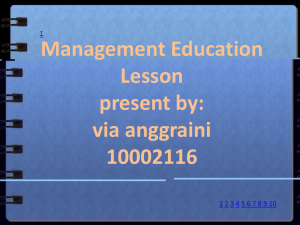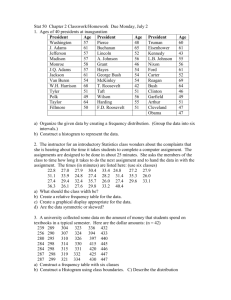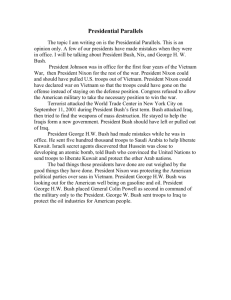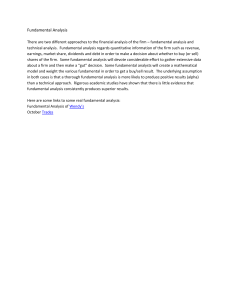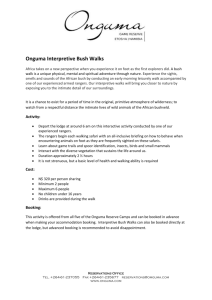That Good Education Might Not Be Enough American workers at all
advertisement
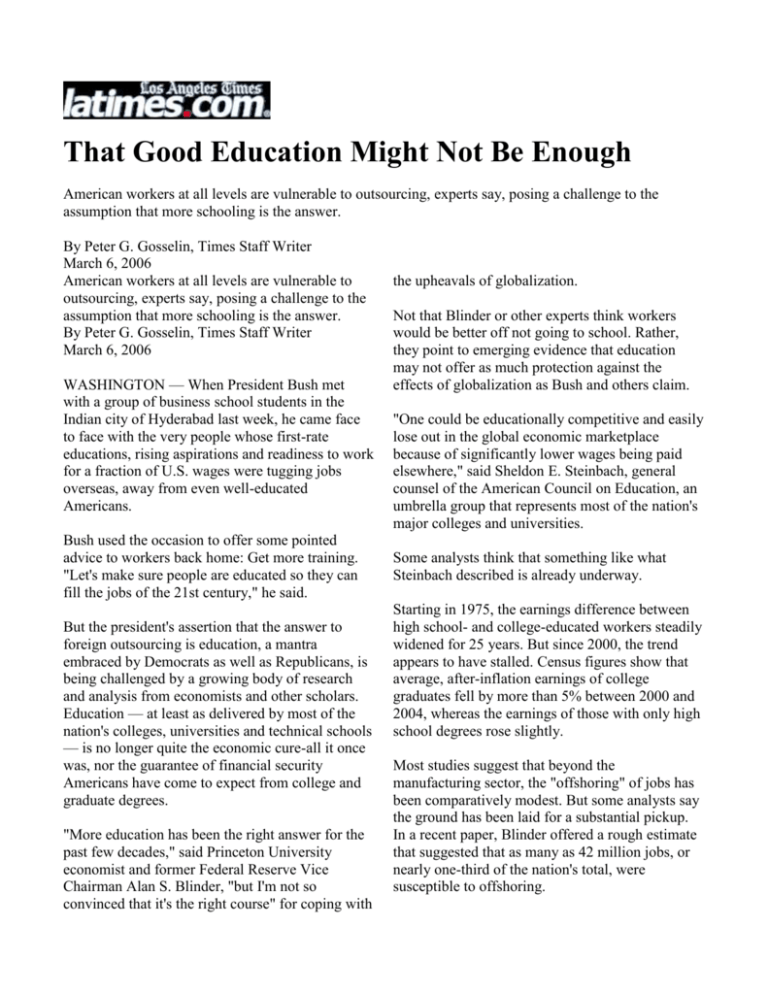
That Good Education Might Not Be Enough American workers at all levels are vulnerable to outsourcing, experts say, posing a challenge to the assumption that more schooling is the answer. By Peter G. Gosselin, Times Staff Writer March 6, 2006 American workers at all levels are vulnerable to outsourcing, experts say, posing a challenge to the assumption that more schooling is the answer. By Peter G. Gosselin, Times Staff Writer March 6, 2006 WASHINGTON — When President Bush met with a group of business school students in the Indian city of Hyderabad last week, he came face to face with the very people whose first-rate educations, rising aspirations and readiness to work for a fraction of U.S. wages were tugging jobs overseas, away from even well-educated Americans. Bush used the occasion to offer some pointed advice to workers back home: Get more training. "Let's make sure people are educated so they can fill the jobs of the 21st century," he said. But the president's assertion that the answer to foreign outsourcing is education, a mantra embraced by Democrats as well as Republicans, is being challenged by a growing body of research and analysis from economists and other scholars. Education — at least as delivered by most of the nation's colleges, universities and technical schools — is no longer quite the economic cure-all it once was, nor the guarantee of financial security Americans have come to expect from college and graduate degrees. "More education has been the right answer for the past few decades," said Princeton University economist and former Federal Reserve Vice Chairman Alan S. Blinder, "but I'm not so convinced that it's the right course" for coping with the upheavals of globalization. Not that Blinder or other experts think workers would be better off not going to school. Rather, they point to emerging evidence that education may not offer as much protection against the effects of globalization as Bush and others claim. "One could be educationally competitive and easily lose out in the global economic marketplace because of significantly lower wages being paid elsewhere," said Sheldon E. Steinbach, general counsel of the American Council on Education, an umbrella group that represents most of the nation's major colleges and universities. Some analysts think that something like what Steinbach described is already underway. Starting in 1975, the earnings difference between high school- and college-educated workers steadily widened for 25 years. But since 2000, the trend appears to have stalled. Census figures show that average, after-inflation earnings of college graduates fell by more than 5% between 2000 and 2004, whereas the earnings of those with only high school degrees rose slightly. Most studies suggest that beyond the manufacturing sector, the "offshoring" of jobs has been comparatively modest. But some analysts say the ground has been laid for a substantial pickup. In a recent paper, Blinder offered a rough estimate that suggested that as many as 42 million jobs, or nearly one-third of the nation's total, were susceptible to offshoring. These analysts warn that more education alone will do little to stop the flow of jobs to other countries. "What's missing here from both parties is a global economic strategy and a worker adjustment strategy," said Anthony P. Carnevale, a scholar at the National Center on Education and the Economy who was appointed to major commissions by Presidents Reagan and Clinton. "When they don't know what else to do," he remarked, "there's a tendency among politicians to stand up and say 'education.' " In Bush's case, arguing for more schooling draws particular fire from some educators, because the administration's record of providing money to support the kind of training he advocates has been weak. Bush previously has defended the offshoring of jobs as an economic reality and a trend that ultimately would work in America's favor. But he was exceptionally candid about its downside during his exchange with the Indian students. "People do lose their jobs as a result of globalization, and it's painful for those who lose their jobs," he said. Even so, Bush continued, the only way forward for Americans is through improved education and progrowth economic policies, not protectionism. "The United States of America will reject protectionism," he said. "We won't fear competition. We welcome competition." In coming down foursquare against erecting trade barriers, Bush extended a string of policy positions he has taken in recent weeks that favor unfettered interaction between countries and corporations over other concerns. These positions have fueled intense controversy, even among fellow Republicans. The president came out strongly, for example, in favor of a plan by an Arab company to take over operations at ports on the East and Gulf coasts, though White House aides subsequently said the administration backed a 45-day review. The proposal by Dubai Ports World provoked bipartisan criticism that Bush was shortchanging national security. Bush also has offered a guest-worker program that's faced criticism in Congress, especially from conservative Republicans who have argued that the president's plan would encourage more migrants to enter the country illegally. Bush's latest plug for the economic importance of education, especially college and graduate education, may contain the seeds for another controversy. Although the president has endorsed education rhetorically, many analysts say that he has not put federal money where his mouth is. "The president's record for supporting college and post-secondary jobs training is anemic," Carnevale said. Total spending on Pell grants, Washington's chief means of providing financial aid to poor collegebound students, rose from $10 billion in the 20012002 school year to $13.1 billion last year, but that was almost entirely because more students qualified. The average amount of aid per student barely budged in after-inflation terms. The maximum school loan under Pell grants has steadily declined since 2002. At $4,050 per year, it covers about one-third of tuition, room and board at a public four-year college, down from 42% when the president took office, according to the College Board, the nonpartisan assessment organization. The president's 2007 budget plan calls for cutting Education Department spending by, among other things, eliminating a major loan program to help needy students attend community college. Last week, Sen. Arlen Specter (R-Pa.), chairman of the Senate Appropriations subcommittee that oversees education, labeled the proposal "scandalous" and "insufficient." But Bush may face a bigger challenge than defending the dollar amounts his administration directs to higher education. He could soon find himself having to defend what until recently has been almost universally accepted as fact — that going to college or graduate school is a nearly certain route to higher pay, and a sure protection against the dislocation spawned by global competition. What's undermining these comfortable assumptions, some analysts say, is a basic change in the kinds of jobs that are vulnerable to offshoring. Declines in transportation costs and improvements in communications technology — including computers and the Internet — are vastly expanding the range of things that can be bought and sold across international borders, and also the range of American workers who are exposed to international competition. Until the last decade or so, most of what could be traded were manufactured goods that could be boxed up and sent abroad or bought overseas. Therefore, it was mostly American manufacturing workers who faced the brunt of competition. Services workers appeared immune and that seemed especially true of highly educated doctors, lawyers, computer programmers and financial experts. But with the growth of the Internet, analysts say, many — although not all — sorts of service work can be performed almost anywhere in the world. Now many kinds of service workers are finding themselves exposed to the same global competition as their manufacturing counterparts. "Many people blithely assume that the critical labor-market distinction is, and will remain, between highly educated (or highly-skilled) people and less-educated (or less-skilled) people, doctors versus call-center operators, for example," Blinder wrote in a recent article in the magazine Foreign Affairs. The assumption is that those with higher education are either better shielded from global competition or better able to adapt to it, he said. And this leads many policymakers to call for "more education and a general 'upskilling' of the workforce." But, Blinder wrote, the crucial distinction in the future may not be between the more-educated and less-educated, but between "those types of work that are easily deliverable through a wire … and those that are not." Some education-heavy jobs such as computer programming are proving easily deliverable by wire and many programming jobs have been shifted overseas, an irony in an era when many had thought that tech-savvy workers would be among the economy's big winners.
